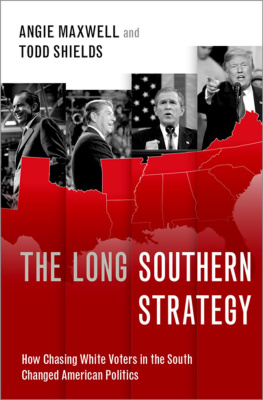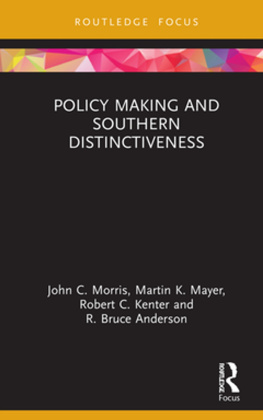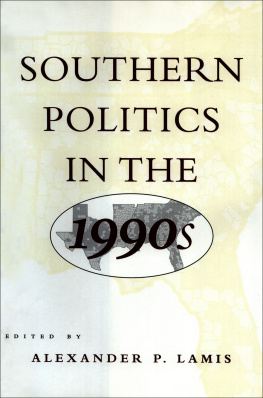Unlocking V.O. Key Jr.
Copyright 2011 by The University of Arkansas Press
All rights reserved
Manufactured in the United States of America
ISBN-10: 1-55728-961-1
eBook ISBN-13: 978-1-55728-961-2
15 14 13 12 11 5 4 3 2 1
Text design by Ellen Beeler

The paper used in this publication meets the minimum requirements of the American National Standard for Permanence of Paper for Printed Library Materials Z39.48-1984.
Library of Congress Cataloging-in-Publication Data
Unlocking V.O. Key Jr.: "southern politics" for the twenty-first century / edited by Angie Maxwell and Todd G. Shields.
p. cm.
Includes bibliographical references and index.
ISBN-13: 978-1-55728-961-2 (pbk.: alk. paper)
ISBN-10: 1-55728-961-1
1. Key, V. O. (Valdimer Orlando), 19081963. Southern politics in state and nationCongresses. 2. Southern StatesPolitics and government21st centuryCongresses. 3. Political cultureSouthern StatesCongresses.
I. Maxwell, Angie, 1978II. Shields, Todd G., 1968
F216.2.U65 2011
975'.044--dc23
2011017765
This book was made possible by the support of the Diane D. Blair Center of Southern Politics and Society and the Winthrop Rockefeller Institute.
The Master, the Acolytes, and the
Study of American Politics
Byron E. Shafer
They cannot look out far,
They cannot look in deep.
But when was that ever a bar
To any watch they keep?
Robert Frost, Taken Singly
Valdimir Orlando Key Jr. was arguably the most eminent political scientist of his day, certainly the most eminent Americanist. He earned this position through seminal research on an array of topics at the center of the American politics syllabus. Little that came from his pen failed to find its way into the subsequent study of American politics. Yet there were four major areas where his work should rightly be viewed as ground-breaking: political parties, electoral change, public opinion, and, last but not least, southern politics. Every one of these areas was distinguished by the focus on a grand normative question, the provision of a main theoretical insight, and the amassing of meticulous empirical detail. Contra Robert Frost, he knew how to look both out far and in deep.
So, Key deserves a look back, most especially in a volume aimed at unlockingrescuing and restoringhis thought. Yet it is in the nature of seminal thinkers that a substantial part of their impact comes by way of the acolytes, those who see something attractive in the work of the master and set out to extend it. In truth, this is the way that knowledge progresses in a successfully institutionalized scholarly discipline. In all likelihood, no one in this volume would actively resist being classified among the acolytes of V. O. Key. Nevertheless, there are three grand trajectories that such disciples can follow. First, they can simply retain and update those ground-breaking insights. The acolytes on political parties come closest to this pattern. Second, they can take the original insights and run with them elsewhere. The acolytes on electoral change come closer to this pattern. Finally, they can salute the master while burying his work. Alas, the acolytes on public opinionperhaps they should be called the apostates?hew more to this third possible result.
And all of that before even arriving at southern politics, the scholarly focus that Key most indisputably owned, the one that has pulled this volume together, and thus the one where its authors have the biggest stake in separating out and properly classifying the work of the master versus those acolytes. To that end, it is necessary to take a quick tour of these other grand realmspolitical parties, electoral change, and public opinionbefore turning to southern politics and asking what Key really said and, most especially, what the work suggests that he would have wanted those who followed him to do.
Key on Political Parties, Electoral Change, and Public Opinion
The dominant text on political parties across the middle of the twentieth century was, in fact, V. O. Key Jr., Politics, Parties, and Pressure Groups, first published in 1942 and last updated in 1964, appearing in a fifth and final edition after the authors death. There were numerous distinguishing features to the text, including an insistence that political parties and social groups should be handled together as critical intermediaries in politics and an emphasis on the far-reaching influence of the primary election as a party-shaper. Yet the single largest and most lasting contribution was the suggestion that the political party, or at least the American party, had to be approached by way of a tripartite conception, that is, party-in-the-electorate, party-as-organization, and party-in-government:
A fundamental difficulty about the term political party is that it is applied without discrimination to many types of groups and neargroups. Discussion may be facilitated by some preliminary differentiations of the usages of the word party. Within the body of voters as a whole, groups are formed of persons who regard themselves as party members. The Democratic group and the Republican group are mobilized only on election day, but in the intervals between elections the members of each groupor many of themreact in characteristic ways to public issues. Party in this sense of party-in-the-electorate is an amorphous group, yet it has a social reality.
In another sense, the term party may refer to the group of more or less professional political workers. The Republican national committee, the Republican state central committees, the Republican county chairmen, and all the men and women who do the work of the political organization constitute a group more or less separate and apart from the party-in-the-electorate, but not necessarily independent of it.
At times, party denotes groups within the government. Thus, all Democratic Representatives form a group within the House that acts with high solidarity on many matters. Similarly, the Republican Senators form a party group. At times, there may be a party-in-the-government including the President, groups of his party in both House and Senate, and the heads of executive departments. We tend always to speak as if there were such a group which could be held accountable for the conduct of government.








 The paper used in this publication meets the minimum requirements of the American National Standard for Permanence of Paper for Printed Library Materials Z39.48-1984.
The paper used in this publication meets the minimum requirements of the American National Standard for Permanence of Paper for Printed Library Materials Z39.48-1984. Byron E. Shafer
Byron E. Shafer